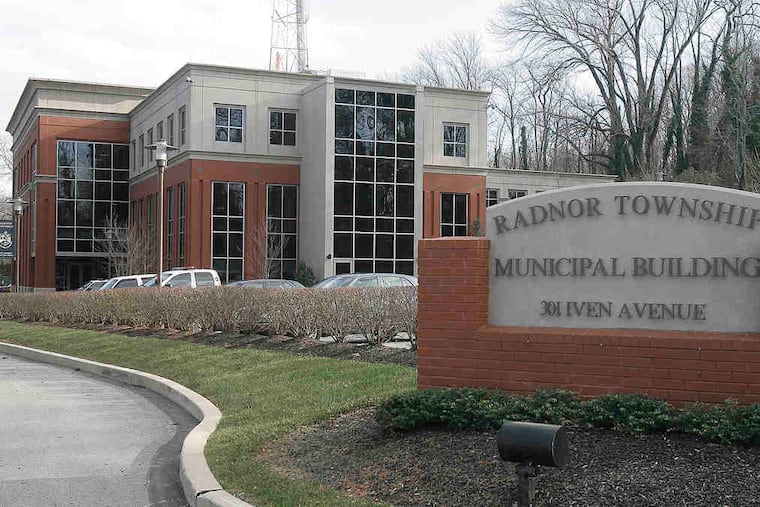Radnor Township blocks its police from intervening in abortions ahead of Roe v. Wade decision
The township’s board of commissioners voted 4-3 to pass the contentious ordinance.

As the nation awaits the Supreme Court’s decision in a case that could overturn Roe v. Wade, which has enshrined abortion rights since 1973, Radnor Township has blocked its police department from investigating or filing charges against people who seek or assist in abortions.
At a Monday meeting, the township’s board of commissioners voted 4-3 to pass the contentious ordinance that would block Radnor Township police officers from becoming involved in investigations into abortions, including stopping them from making arrests, filing criminal charges, or participating in prosecution of a person accused of facilitating, providing, or receiving abortion services.
The ordinance, which was proposed in late May, took effect Monday.
The Radnor Township Police Department declined to comment.
Residents and commissioners have reacted with a mix of vocal opposition and support. Those in opposition say the ordinance will hamstring police officers and is immoral. Others called the measure unnecessary and “political theater.”
Those who supported the ordinance say it is a preventative measure to protect people seeking and providing abortions in the face of a potentially historic decision that could upend abortion rights.
“In my wildest dreams when I was elected to a local position in the township did I think we would be debating the abortion issue,” said Moira Mulroney, the president of the board of commissioners. “I also didn’t know this Supreme Court would be coming down with an opinion that would overrule a long-standing — my entire lifetime this has been a protected right.”
» READ MORE: Abortion in the Philadelphia area: Here’s what to know
The ordinance was drawn up by Commissioner Jack Larkin, a municipal litigator, and brought to the board in late May as a direct response to the leaked Supreme Court decision that would overturn Roe v. Wade, said Mulroney and Larkin.
“We’re just trying to take some sort of action in our role as elected officials in our community,” said Mulroney.
At two meetings, residents came out in droves to voice their opinions. One resident Monday said the board should be “ashamed of themselves,” calling abortion “barbarism.” Another said the ordinance was a way to signal that doctors and people seeking abortions would not be considered criminals in Radnor Township.
For Commissioner Sean Farhy, who voted against the ordinance, the measure was “political theater” that overstepped the board’s authority.
“I am a Democrat and I am pro-choice,” Farhy said. “I don’t believe it’s up to the township to create laws that supersede federal and state laws. They hold no bearing. They hold no weight. And it’s just going to put us — potentially — with a lot of litigation all while hurting vulnerable women who are in crisis situations.”
» READ MORE: Who gets abortions in Pennsylvania, according to the data
The ordinance, said David S. Cohen, a professor at Drexel University who specializes in abortion law and is an abortion-rights advocate, was not quite symbolic. But there are limited applications for its use.
The ordinance would have limited application because Radnor Township does not have an abortion clinic or abortion providers, said Cohen. Abortion laws would and could still be enforced through civil lawsuits and licensure, but that would not involve police.
Overturning Roe v. Wade would kick abortion laws back to state jurisdiction, said Cohen. At that point, the question is whether Pennsylvania’s laws could become more restrictive, and who would enforce them.
» READ MORE: How the Mississippi Supreme Court case could impact abortion access in Pa. and N.J.
“To the best of my knowledge there’s no state law requiring local police officers to investigate every crime in the state codes,” Cohen said. “They’re basically saying the police force — which is under our control — is not going to do anything to enforce the abortion laws in Pennsylvania.”
“It raises questions of whether if there were some related abortion crime that took place in Radnor Township, if the local police aren’t going to do it, would the state police step in?” he said.
Cohen said ordinances like Radnor Township’s may start a discussion about what individual municipalities can do and what state legislators might do in response.
At least one Texas legislator, for instance, has already vowed to propose legislation that would allow district attorneys from anywhere in the state to prosecute companies that violated state abortion law if the local district attorney declines, the New York Times reported.
» READ MORE: U.S. abortions rise: 1 in 5 pregnancies terminated in 2020
Opponents of the ordinance like Farhy voiced concerns that its passage will leave people seeking abortions vulnerable and put their health at risk, if police stop responding to any abortion-related emergency calls. But proponents say that’s inaccurate.
“We are not asking police to ignore calls for help,” said Mulroney. “If somebody is calling 911 because a self-induced abortion went wrong, they’re going to respond to that person and get them the emergency care that they need. What they’re not going to do is start interrogating them about why they have that injury.”